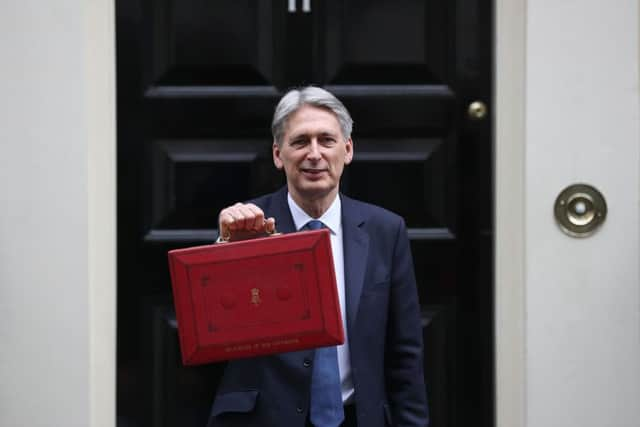Budget 2018: Chancellor Philip Hammond claims '˜austerity has come to an end'
Mr Hammond said his Budget was aimed at helping “the strivers, the grafters and the carers” and would pave the way for a “brighter future”.
And he hinted that an emergency Budget could take place in the Spring, adding: “If the economic or fiscal outlook changes materially in-year I reserve the right to upgrade the Spring Statement to a full fiscal event”.


Advertisement
Hide AdAdvertisement
Hide AdNHS spending in England will rise by £20.5bn over the next five years, with Scotland getting a £950m windfall from new spending announcements.
The Office for Budget Responsibility (OBR) said the budget represents the biggest government giveaway since 2010.
There had been speculation that a Conservative manifesto pledge to cut taxes by raising income thresholds would have to be put off in order to afford the extra spending on the NHS.
But in a surprise announcement, the Chancellor brought the tax cuts forward, meaning that from April next year, the first £12,500 earned will ba tax free.
The threshold for the 40p tax rate will rise to £50,000 in a tax cut worth at least £130 for 32m workers across the UK.
Speaking in the Commons Mr Hammond said he was promising a “Budget for hard-working families” and told MPs “we have reached a defining moment on this long, hard journey” after repairing the damage to the public finances caused by the financial crash.
But there were signs of a rift on the horizon, with Downing Street insisting that the spending boost would take place regardless of the outcome of Brexit talks, while Mr Hammond referred to a “deal dividend”.
While the Treasury said its spending commitments were fully costed, the Chancellor confirmed that there could be an emergency budget if the UK leaves the EU without a Brexit deal in March next year.
Advertisement
Hide AdAdvertisement
Hide Ad“If the economic or fiscal outlook changes materially in-year I reserve the right to upgrade the Spring Statement to a full fiscal event,” Mr Hammond said.
An additional £500m has been put aside for no-deal preparations, bringing the total government contingency fund to £2bn.
In a bid to encourage company spending in the year after the UK leaves the EU, the tax-free threshold for business investment will shoot up from £200,000 to £1m in the 12 months from April 2019.
Mr Hammond responded to cross-party concern at the impact of welfare reforms on the poorest benefits claimants, committing an extra £1bn over five years to ease the transition to Universal Credit, on top of £1.7bn to reverse cuts to the benefit announced by George Osborne.
The chancellor also announced a new £400m a year tax on tech giants that shift their profits overseas.
